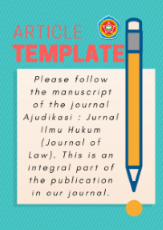Dinamika Pemberian Dispensasi Kawin dibawah Umur oleh Hakim Pasca Perubahan Undang-Undang Perkawinan
DOI:
https://doi.org/10.30656/ajudikasi.v7i1.6448Keywords:
Dispensation, Marriage, Regulation, Judge, JudicialAbstract
The granting of marriage dispensation by judges experienced a discourse from the age of marriage, which originally occurred because of the age difference between men and women, which caused family conditions that were not solid, with the younger age of women causing marriage to look more discriminating against women in the purpose of marriage. Then it changed to a regulation that equalized the age limit for marriage for both men and women. In the treatment of deviations from the rules of marriage age, it is also emphasized that there is equal treatment. However, this cannot limit the judges' ability to render judgments. The examination of marriage dispensation must be carried out thoroughly, so the focus of this study is on how the dynamics present in each decision by judges need to be analyzed. The research method is a study of normative law related to the provisions of the marriage dispensation. The analysis is carried out with the theory of judicial power, which includes legal justice, legal certainty, and legal expediency. The results showed that every judge's decision is affected by the disparity of the judgment on the granting of marriage dispensation when the judge does not examine all the offenses of the application for dispensation in the search for the application for dispensation, which becomes the basis for the judge to consider the decision. So that stigma for urgent reasons does not become unclear and clear. Therefore, every trial must systematically follow the judicial process in order to realize the purpose of marriage.
Downloads
References
Buku:
Hotama, 2016, Kekuasaan Kehakiman Indonesia, Jakarta:Krakatauw Book.
Widayati, 2016, Negara Hukum, Konstitusi, Dan Pembentukan Perundang-undangan, Semarang-Unissula Press.
Cholil Achmad, 2016, Perlindungan Hak-Hak Anak di Peradilan Agama, (Jakarta: Direktorat Jenderal Badan Peradilan Agama MA RI.
Jurnal :
Salam Safrin, Dispensasi Perkawinan Anak di Bawah Umur: Perspektif Hukum Adat, Hukum Negara & Hukum Islam, Jurnal Pagaruyuang Law Journal, Universitas Muhammadiyah Buton, Vol. 1, No.1, 2017.
Syafi’i Imam, dkk, Penetapan Dispensasi Kawin Oleh Hakim, Jurnal, Mabahits:Jurnal Hukum Keluarga, Vol.01, No.02, 2020, UNZAH.
Kurniawan, M.Beni, dkk, Penafsiran Makna “Alasan Sangat Mendesak†Dalam Penolakan Permohonan Dispensasi Kawin, Jurnal, Yudisial, Vol.15, No.1, 2022, UI/PA Krui,
Judiasih, Sonny Dewi, Kontradiksi Antara Dispensasi Kawin Dengan Upaya Meminimalisir Perkawinan Bawah Umur Di Indonesia, Acta Diurnal Jurnal Ilmu Hukum Kenotariatan, Universitas Padjajaran Bandung, Vol. 3, Nomor 2, 2020.
Muqaffi Ahmad, dkk, Menilik Problematika Dispensasi kawin Dalam Upaya Pencegahan Pernikahan Anak Pasca Revisi UU Perkawinan, Journal Of Islamic And Law Studies, UIN Antasari, Vol. 5, No. 3, 2021.
Prabowo, Bagya Agung, Pertimbangan Hakim dalam Penetapan Dispensasi Perkawinan Dini Akibat Hamil di Luar Nikah pada Pengadilan Agama Bantul, Jurnal Hukum Ius Quia Iustum, No.2, Vol. 20, 2013.
Muhamad Arif Rohman, dkk, Alasan-Alasan Pemberian Dispensasi Kawin Terhadap Pasangan Usia Nikah Di Bawah Umur Pada Pengadilan Agama Semarang Tahun 2018, Konferensi Ilmiah Mahasiswa Unissula (KIMU), Universitas Islam Sultan Agung, 2019.
Ma’shum HA. Djazim, Tinjauan Yuridis Terhadap Permohanan Dispensasi kawin Anak Dibawah Umur, Jurnal Hukum Politik dan Agama,STIH Zainul Hasan Probolinggo, Vol. 01, No. 01, 2021.
Al Hasan, Fahadil Amin, dkk, Dispensasi Kawin Dalam Sistem Hukum Indonesia Menjamin Kepentingan Terbaik Anak melalui Putusan Hakim, Jurnal Al-Ahwal, PA Pasir Pengairan Riau & UIN Sunan Djati Bandung, Vol. 14, No. 1, 2021.
Peraturan Perundang-Undangan :
UU No. 1 Tahun 1974 Tentang Perkawinan
UU No. 19 Tahun 2019 Tentang Perubahan UU No. 1 Tahun 1974 Tentang Perkawinan
Naskah Internet/Website:
bps.go.id/Publikasi 28 Februari 2023.
Downloads
Published
Issue
Section
License
Authors who publish with this journal agree to the following terms:
Authors retain copyright and grant the journal right of first publication with the work simultaneously licensed under a Creative Commons Attribution License that allows others to share the work with an acknowledgment of the work's authorship and initial publication in this journal.
Authors can enter into separate, additional contractual arrangements for the non-exclusive distribution of the journal's published version of the work (e.g., post it to an institutional repository or publish it in a book) with an acknowledgment of its initial publication in this journal.
Authors are permitted and encouraged to post their work online (e.g., in institutional repositories or on their website) before and during the submission process, as it can lead to productive exchanges and earlier and greater citation of published work.
All articles in Ajudikasi : Jurnal Ilmu Hukum can be disseminated provided they include the identity of the article and the source of the article (Ajudikasi : Jurnal Ilmu Hukum). The publisher is not responsible for the contents of the article. The content of the article is the sole responsibility of the author
Ajudikasi : Jurnal Ilmu Hukum is lincensed under a Creative Commons Attribution-ShareAlike 4.0 International License.









1.png)
.png)
.png)





.png)
.png)
.png)
.png)





.png)







